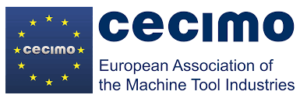 During its General Assembly Meetings, CECIMO conducted an inquiry with CEOs and owners of European machine tool companies. Accordin g to the inquiry:
During its General Assembly Meetings, CECIMO conducted an inquiry with CEOs and owners of European machine tool companies. Accordin g to the inquiry:
• For most of the companies that participated in the enquiry, data-driven business models will be the most prioritized over the next 10 years (other business models include services based on inhouse knowledge, product-as-a-service, and platform-based).
• Half of the machine tool builders questioned said that launching new education programmes in Europe that merge ICT and production technologies is the most important policy pillar to underpin new business models, followed by future-proof and technology neutral regulations.
• The majority of the machine tool builders find that understanding customers’ digital needs and cooperating with them are essential to develop new business models.
“Machine tool builders are increasingly facing difficulty in finding the workforce possessing the knowledge and skills needed to apply digital solutions in the field of advanced manufacturing. In order to tackle this pressing challenge, public authorities at national and regional levels as well as education providers together with the industry should invest more in the design and delivery of a new education approach merging various disciplines including software programming and production technologies. Secondly, we see that Member States are launching and implementing ambitious investment programmes in modernization of manufacturing and service-based business models. Nevertheless, the EU has an important role to play in the coordination and acceleration of such investment programmes. We can only cope with the competitive pressures
arising from across the world by pooling our resources in Europe and coordinating our actions” states Mr Filip Geerts, CECIMO Director General.
Paving the way for a data-driven manufacturing sector in Europe
Existing EU regulation on data have mainly focused on personal information protection and does not address the complexities of manufactures in B2B sectors. Currently, access to raw data generated by machines is generally defined by contracts between suppliers and users. Nevertheless, working with bilateral contracts in the future may be challenging as the amount and type of data collected are increasing and data-driven business models are likely to grow through industrial data platforms and
networks. Under this light, future-proof and technology-neutral key principles and greater certainty on the right to
access different types of data generated by machines along the value chain are a necessity for industrial actors to tap into new business opportunities. “If Europe wants a competitive and data-driven industrial base, machine tool builders will need access to the data deriving from the machines used by various customers along the value chain. Clear benefits of this access include increased productivity, safety, energy and resource-efficiency for the entire European industry, taking into account the fact that machine tools are a key enabler of the production of other industrial equipment and machinery across various sectors” points out Mr Luigi Galdabini, CECIMO President.
Economic situation and outlook
In spite of the global economy’s weakening growth and high levels of uncertainty in international trade relations, the European machine tool industry shows clear signs of strength. The machine tool production in Europe grows its global market share to exceed 40% in 2016.
Investment in modern manufacturing equipment remains relatively low, but the recovery of the economic activity is visible and the business confidence in Europe may support additional growth in investment. All economic indicators from the destination markets point to a stable growth momentum. The global machine tool production will decrease slightly (2% – 3%) from 61.5 billion euro in 2015 to 60 billion in 2016. Brazil and China are reporting negative MT consumption and production with negative double digit figures. CECIMO estimates the European machine tool industry will defeat this trend and confirm the good results of 2015 by exporting again an amount of 18,7 billion euro. Exports to Asia are declining in line with the local economic developments. Exports to Russia are heavily impacted (-30% yoy) by the EU trade sanctions. Exports to the Americas are increasing due to investment into new or upgraded automotive plants in the US and Mexico. Then domestic European
consumption is supported by a resilient investment climate in Europe with ongoing investments into more efficient production equipment.
In addition, the growing digitisation efforts in the manufacturing sector makes the European machine tool offering increasingly attractive for foreign markets. On the domestic side, consumption and some previously postponed investments drive local machine tool sales. Despite a lagging global consumption trend, CECIMO is well prepared to keep its production above 24 billion euro and further grow its global market share.



